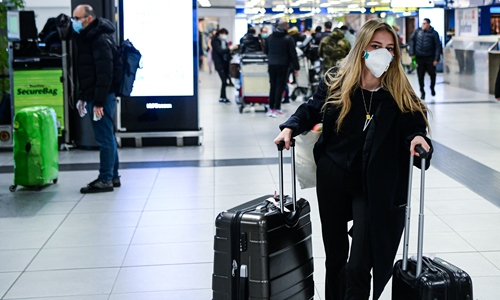Epidemic tests Italian health system
Nationwide mobilization required to make lockdown effective: analysts

A passenger wearing a protective face mask, amid concerns about the COVID-19 outbreak, walks in Linate Airport in Milan, Italy on Sunday. The country reported a spike of 1,247 new infections on Saturday. Photo: AFP
Without nationwide mobilization and sufficient medical resources, the effectiveness of Italy's lockdown in stemming the spread of the COVID-19 virus remains an open question, Chinese observers said.
Italy locked down the entire Lombardy, Italy's richest region, and 14 other provinces starting Sunday until April 3.
Italy reported 5,883 COVID-19 infections as the death toll passed 200 as of Saturday.
Gyms, museums and cinemas were closed. All schools and universities suspended studies as Italy imposed travel restrictions and called off public events, following the example of China where these control measures had proven effective.
Italians and overseas Chinese reached by the Global Times shared a common impression that Italians generally don't wear masks. Those interviewed were surprised that lockdown was eventually imposed in Italy.
Videos that circulated online showed crowded train stations as people sought to leave restricted cities before the lockdown took effect.
Some overseas Chinese told the Global Times that they were not leaving because it seemed unwise to travel which increased the risks of infection en route and endangered others.
They noted Italians haven't started panic-buying or scrambling for supplies. There are no obvious signs of commodity shortages.
Bigger stores in Milan have been closing, but grocery stores, bars and cafes remained open, they said.
Shopping malls with daily necessities and food have not closed except at the weekend.
Residents continue working and public transport remained open as usual. Roads under lockdown are guarded by police officers, but everything else seems normal, Chi Xiaoyun, honorary president of the Wenzhou overseas Chinese business chamber in Milan, told the Global Times on Sunday.
Without nationwide mobilization and sufficient medical resources, the effectiveness of Italy's lockdown in stemming the spread of the COVID-19 virus remains an open question, Chinese observers said.
Italy locked down the entire Lombardy, Italy's richest region, and 14 other provinces starting Sunday until April 3.
Italy reported 5,883 COVID-19 infections as the death toll passed 200 as of Saturday.
Gyms, museums and cinemas were closed. All schools and universities suspended studies as Italy imposed travel restrictions and called off public events, following the example of China where these control measures had proven effective.
Italians and overseas Chinese reached by the Global Times shared a common impression that Italians generally don't wear masks. Those interviewed were surprised that lockdown was eventually imposed in Italy.
Videos that circulated online showed crowded train stations as people sought to leave restricted cities before the lockdown took effect.
Some overseas Chinese told the Global Times that they were not leaving because it seemed unwise to travel which increased the risks of infection en route and endangered others.
They noted Italians haven't started panic-buying or scrambling for supplies. There are no obvious signs of commodity shortages.
Bigger stores in Milan have been closing, but grocery stores, bars and cafes remained open, they said.
Shopping malls with daily necessities and food have not closed except at the weekend.
Residents continue working and public transport remained open as usual. Roads under lockdown are guarded by police officers, but everything else seems normal, Chi Xiaoyun, honorary president of the Wenzhou overseas Chinese business chamber in Milan, told the Global Times on Sunday.
"Italians don't wear masks. They just keep a safe distance between people," Ricky, a Milanese Italian told the Global Times.
He believed the lockdown is temporary and that it would be lifted soon.
Some Italians opposed the lockdown and accused the government of being unclear.
Requiring about a quarter of the country's population to follow quarantine measures and stay at home seems like a mission impossible for Italians who advocate "so-called freedom and individualism," a Chinese analyst said. He requested anonymity
People in Italy, the birthplace of the Renaissance, are known for being "romantic and unrestrained," according to Wang Yiwei, director of the Centre for European Union studies at the Renmin University of China in Beijing.
Wang noted that locking down a part of Italy may not reverse the epidemic as people traveling freely with a Schengen visa still raised the risks of virus transmission. "The whole nation and even the European Union need to act instead."
Chinese in Italy have posted on social media that the transportation was not cut and the lockdown seemed verbal.
The widening coronavirus infection would test the Italian health system, Wang said.
He underlined China's free treatment and nationwide mobilization and wondered whether the Italian government and the EU would devote sufficient medical resources to the outbreak.
If medical resources could not be dispatched to the sealed-off regions and protective equipment was in short supply, the epidemic would continue spreading, Sima Pingbang, a Beijing-based cultural critic told the Global Times.
China's mechanism required officials, police officers and social workers to fight together, Sima said.
"Many sacrificed their lives," he said.
This powerful Chinese mechanism backed up quarantine measures and cut off all possible routes of transmission for the epidemic, he believed.